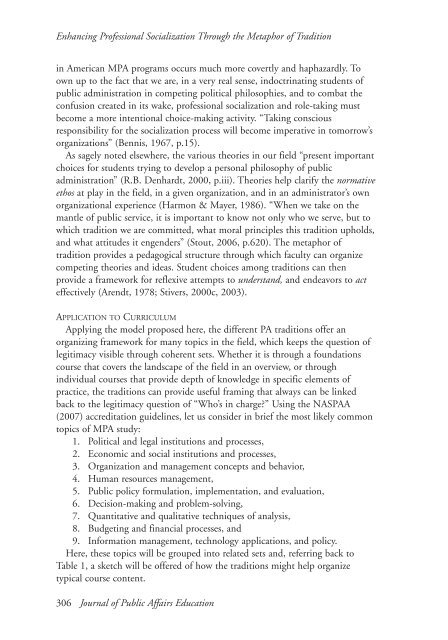JOURNAL OF PUBLIC AFFAIRS EDUCATION - naspaa
JOURNAL OF PUBLIC AFFAIRS EDUCATION - naspaa
JOURNAL OF PUBLIC AFFAIRS EDUCATION - naspaa
Create successful ePaper yourself
Turn your PDF publications into a flip-book with our unique Google optimized e-Paper software.
Enhancing Professional Socialization Through the Metaphor of Tradition<br />
in American MPA programs occurs much more covertly and haphazardly. To<br />
own up to the fact that we are, in a very real sense, indoctrinating students of<br />
public administration in competing political philosophies, and to combat the<br />
confusion created in its wake, professional socialization and role-taking must<br />
become a more intentional choice-making activity. “Taking conscious<br />
responsibility for the socialization process will become imperative in tomorrow’s<br />
organizations” (Bennis, 1967, p.15).<br />
As sagely noted elsewhere, the various theories in our field “present important<br />
choices for students trying to develop a personal philosophy of public<br />
administration” (R.B. Denhardt, 2000, p.iii). Theories help clarify the normative<br />
ethos at play in the field, in a given organization, and in an administrator’s own<br />
organizational experience (Harmon & Mayer, 1986). “When we take on the<br />
mantle of public service, it is important to know not only who we serve, but to<br />
which tradition we are committed, what moral principles this tradition upholds,<br />
and what attitudes it engenders” (Stout, 2006, p.620). The metaphor of<br />
tradition provides a pedagogical structure through which faculty can organize<br />
competing theories and ideas. Student choices among traditions can then<br />
provide a framework for reflexive attempts to understand, and endeavors to act<br />
effectively (Arendt, 1978; Stivers, 2000c, 2003).<br />
APPLICATION TO CURRICULUM<br />
Applying the model proposed here, the different PA traditions offer an<br />
organizing framework for many topics in the field, which keeps the question of<br />
legitimacy visible through coherent sets. Whether it is through a foundations<br />
course that covers the landscape of the field in an overview, or through<br />
individual courses that provide depth of knowledge in specific elements of<br />
practice, the traditions can provide useful framing that always can be linked<br />
back to the legitimacy question of “Who’s in charge” Using the NASPAA<br />
(2007) accreditation guidelines, let us consider in brief the most likely common<br />
topics of MPA study:<br />
1. Political and legal institutions and processes,<br />
2. Economic and social institutions and processes,<br />
3. Organization and management concepts and behavior,<br />
4. Human resources management,<br />
5. Public policy formulation, implementation, and evaluation,<br />
6. Decision-making and problem-solving,<br />
7. Quantitative and qualitative techniques of analysis,<br />
8. Budgeting and financial processes, and<br />
9. Information management, technology applications, and policy.<br />
Here, these topics will be grouped into related sets and, referring back to<br />
Table 1, a sketch will be offered of how the traditions might help organize<br />
typical course content.<br />
306 Journal of Public Affairs Education
















